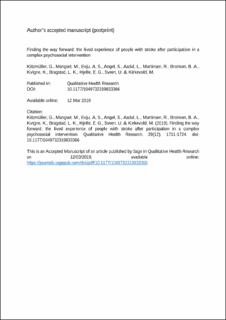| dc.contributor.author | Kitzmüller, Gabriele | |
| dc.contributor.author | Mangset, Margrete | |
| dc.contributor.author | Evju, Anne Svelstad | |
| dc.contributor.author | Angel, Sanne | |
| dc.contributor.author | Aadal, Lena | |
| dc.contributor.author | Martinsen, Randi | |
| dc.contributor.author | Bronken, Berit Arnesveen | |
| dc.contributor.author | Kvigne, Kari Johanne | |
| dc.contributor.author | Bragstad, Line Kildal | |
| dc.contributor.author | Hjelle, Ellen Gabrielsen | |
| dc.contributor.author | Sveen, Unni | |
| dc.contributor.author | Kirkevold, Marit | |
| dc.date.accessioned | 2020-05-15T07:24:30Z | |
| dc.date.available | 2020-05-15T07:24:30Z | |
| dc.date.created | 2019-03-15T23:12:10Z | |
| dc.date.issued | 2019 | |
| dc.identifier.citation | Kitzmüller, G., Mangset, M., Evju, A. S., Angel, S., Aadal, L., Martinsen, R., Bronken, B. A., Kvigne, K., Bragstad, L. K., Hjelle, E. G., Sveen, U. & Kirkevold, M. (2019). Finding the way forward: the lived experience of people with stroke after participation in a complex psychosocial intervention. Qualitative Health Research, 29(12), 1711-1724. doi: | en_US |
| dc.identifier.issn | 1552-7557 | |
| dc.identifier.uri | https://hdl.handle.net/11250/2654550 | |
| dc.description | Author's accepted version (postprint). | en_US |
| dc.description | This is an Accepted Manuscript of an article published by Sage in Qualitative Health Research on 12/03/2019. | |
| dc.description | Available online: https://journals.sagepub.com/doi/pdf/10.1177/1049732319833366 | |
| dc.description.abstract | Stroke patients’ well-being is threatened after stroke. A psychosocial intervention was developed for Norwegian stroke patients living in the community. Eight individual sessions between people with stroke and a trained health care professional were conducted 1 to 6 months post-stroke with one group of participants and 6 to 12 months post-stroke with another group. Subsequently, 19 of these stroke patients were interviewed to gain an in-depth understanding of their lived experience of the influence of the intervention on their adjustment process. Interview texts were analyzed using Ricoeur’s interpretation theory. Two participants did not personally find the intervention useful. The remaining participants greatly appreciated dialogues with the empathetic intervention personnel, feeling free to discuss their fears and worries. The intervention raised these participants’ awareness of their needs and resources. They were guided to resume their everyday life and adopt a future-oriented attitude. The intervention facilitated their meaning-making endeavors and post-stroke adjustment. | en_US |
| dc.description.abstract | Finding the way forward : the lived experience of people with stroke after participation in a complex psychosocial intervention | en_US |
| dc.language.iso | eng | en_US |
| dc.publisher | Sage | |
| dc.relation.uri | https://journals.sagepub.com/doi/10.1177/1049732319833366 | |
| dc.title | Finding the way forward : the lived experience of people with stroke after participation in a complex psychosocial intervention | en_US |
| dc.type | Peer reviewed | en_US |
| dc.type | Journal article | en_US |
| dc.description.version | acceptedVersion | en_US |
| dc.rights.holder | © 2019 The Author(s) | en_US |
| dc.subject.nsi | VDP::Medisinske Fag: 700::Klinisk medisinske fag: 750::Nevrologi: 752 | en_US |
| dc.subject.nsi | VDP::Samfunnsvitenskap: 200::Psykologi: 260 | en_US |
| dc.source.pagenumber | 1711-1724 | en_US |
| dc.source.volume | 29 | en_US |
| dc.source.journal | Qualitative Health Research | en_US |
| dc.source.issue | 12 | en_US |
| dc.identifier.doi | 10.1177/1049732319833366 | |
| dc.identifier.cristin | 1685278 | |
| dc.relation.project | EC/FP7/609020 | en_US |
| dc.relation.project | South-Eastern Norway Regional Health Authority: 2013086 | |
| dc.relation.project | Extra Foundation: 2015/FO13753 | |
